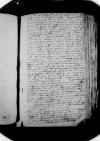Letter #2427
Ioannes DANTISCUS to [Sigmund von HERBERSTEIN]Braunsberg (Braniewo), 1541-05-26
English register:
Dantiscus received Herberstein’s letter from Vienna, dated March 22, on May 10, [1541] in Marienburg (Malbork). He informs him that he wrote to him twice (during Herberstein’s stay in Vilnius in 1540 and in January 1541), and explains why these letters did not reach the addressee.
Through a messenger of Prussian duke Albrecht [von Hohenzollern], who is going to Regensburg, Dantiscus has sent a letter to Cornelis De Schepper with similar explanations. He points out that recently letters have been disappearing suspiciously.
He sends the news: the King of Sweden [Gustaw I Vasa], has armed a great fleet. Denmark is in a state of war again, because the truce with Burgundy has just expired. Duke Albrecht is watching to make sure there is no harm to him in this, and he also fears an alliance between Sweden and the Livonian Order. England, Scotland and France are keeping their fleets in readiness. In Royal Prussia, especially in larger towns, the fire of heresy is spreading. Dantiscus has hope in God for peace and understanding on matters of religion, but also thinks the example should come from the top [from Pope Paul III].
He treats Herberstein’s remark that the present [Hungarian] affairs would need the presence and experience of Dantiscus, as a friendly compliment and not an impartial opinion. He feels helpless in the face of the problems of the new times, and can only help by praying. He asks Herberstein to commend him to King Ferdinand I’s attention and asks for news from Regensburg.
Manuscript sources:
Prints:
| ||||||
Text & apparatus & commentary Plain text Text & commentary Text & apparatus Excerpts concerning Dantiscus' travels
Magnifice et Spectabilis Domine, amice carissime ac honorande. Salutem Magnificentiae Vestrae et omnia precor faustissima.
Accepi
Nescio quo fato litterae meae, quod et de iis subvereor, ad Magnificentiam Vestram, ad quam non nisi sincero scribuntur animo, non
attingunt. Scripseram, cum novissime Magnificentia Vestra Vilnae ageret[7] cum generoso domino
cf.
Pro novis, quae scripsit, Magnificentiae Vestrae magnas habeo gratias, referrem quidem, si quid eiusmodi apud nos haberetur. Ne tamen novarum rerum omnino has legat vacuas, quae ad nos mari perlata sunt, sic in compendio feruntur.
Quod Magnificentia Vestra annotavit, ad negotia, quae modo tractantur[17], auctoritatem meam desiderari, fit magis amico quam iusto de me iudicio, nihil ego eiusmodi in me agnosco, quod ad haec tempora commodum esse possit. Et quantum coniicere possum
ea, quae hoc nostro saeculo fiunt, non humanis viribus seu consiliis dirigi componive concessum esse, sed in solius Dei consistere potentia[18]. Proinde si quid a me vel me longe praestantioribus praestandum sit, id non nisi lacrimis et intimis
orationibus, ut omnia in melius convertantur, a Domino Deo obtinendum. Qui Magnificentiam Vestram, quam, quemadmodum in
Dat(ae) or Dat(um)⌈Dat(ae)Dat(ae) or Dat(um)⌉
Magnificentiae Vestrae additissimus
Postscript:
Non velit Magnificentia Vestra, pro veteri inter nos benevolentiae coniunctione, gravari ad me de iis, quae in


 OSK, Fol Lat. 258, f. 285r
OSK, Fol Lat. 258, f. 285r